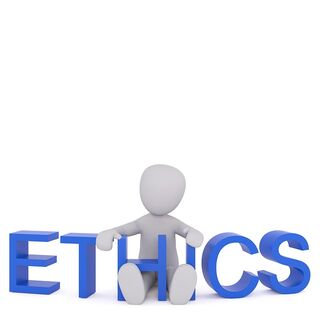Altruism
Becoming More Ethical
Deciding to do the right thing — even when it's inexpedient.
Posted January 22, 2021

Most people know the ethical thing to do, but when it's inexpedient, they may succumb to the temptations of money, power, or hooking-in the romantic partner they want.
Most people act ethically when it is expedient—for example, making a sizeable charitable donation because the right people will see it (only a tiny percentage of charitable donations are made anonymously). The challenge is to do the right thing when it's inexpedient.
Ethics refers not just to obvious malfeasance such as absconding with employer money, sandbagging a rival for a promotion, or feigning love to trap a desirable romantic partner. It's more often such behaviors as a salesperson withholding information that would nix a sale, a romantic partner being unduly selfish, or a boss earning enough to live richly while worker bees struggle to survive.
Here, I describe how a pretty simple way to become more ethical. For space limitations, I will leave to another day the question of whether the poor can afford to be as scrupulously ethical. I focus here on people who don’t have to worry about whether they have a decent roof over their heads.
First, a definition of ethical: It's making decisions based on what will do the most good for your sphere of influence. Or, if you want to be loftier, it's behaviors that comport with universal values, such as contributing to the gross world contentment. In short, it's behaving altruistically rather than egoistically.
Becoming more ethical asks you to consider just two assertions:
You will selfishly benefit.
- For every day for the rest of your life, you’ll walk the earth feeling good about how you’re living your life.
- You’ll be more respected by friends, family, and colleagues.
- As a good role model, you'll be prouder of your kids' behavior.
- In the long run, you’ll be more trusted and possibly have more success than if people are dubious about your ethics.
External benefit. Apart from altruism's selfish benefits, wouldn't you want your behavior to yield broader good than would accrue from ill-acquired fancier digs in a tonier zip code, a luxury car, frou-frou clothes, and five-star vacations? Most holders of dubiously obtained wealth would have a hard time luxuriating in their manses and yachts if they stopped to remind themselves that their behavior, directly or indirectly, caused other people to have to cut their medication in half to make it last longer.
Plus, if you act ethically, altruism's effect is multiplicative:
- Your actions often benefit more than one person.
- Your altruism's beneficiaries are more likely to be more altruistic. Even if your action helped just two people at work and they become just a bit more ethical to two others, four people become more ethical, and four begets 16, 16 begets 64, and so on.
- Your friends, and family, on seeing you behave ethically, are more likely to do so themselves, which too yields multiplicative benefit.
If you can accept the validity of those two assertions, you can fairly easily incorporate more altruism into your daily behavior.
To that end, for a few days at least, keep a memo pad with you and your antenna out for situations in which you have a choice between an egoistic, expedient decision and an altruistic, inexpedient one. After each, day, review your decisions. How do you feel about them?
Many people grow from being in a group. If that sounds like you, consider inviting a few friends to meet regularly on Zoom, teleconference, or when COVID-safe enough, in person. As in an Alcoholics Anonymous group, members can bring up their successes and challenges.
At a time when people are struggling to survive practically and psychologically, urging such a high standard of ethics may seem out-of-touch, but ethics truly does trump all. Perhaps this article will encourage you to aspire to be the ethical person that, deep down, most people want to be.
I read this aloud on YouTube.


